新概念英语第二册Lesson 3 Please send me a card课件(共26张PPT)
文档属性
| 名称 | 新概念英语第二册Lesson 3 Please send me a card课件(共26张PPT) | 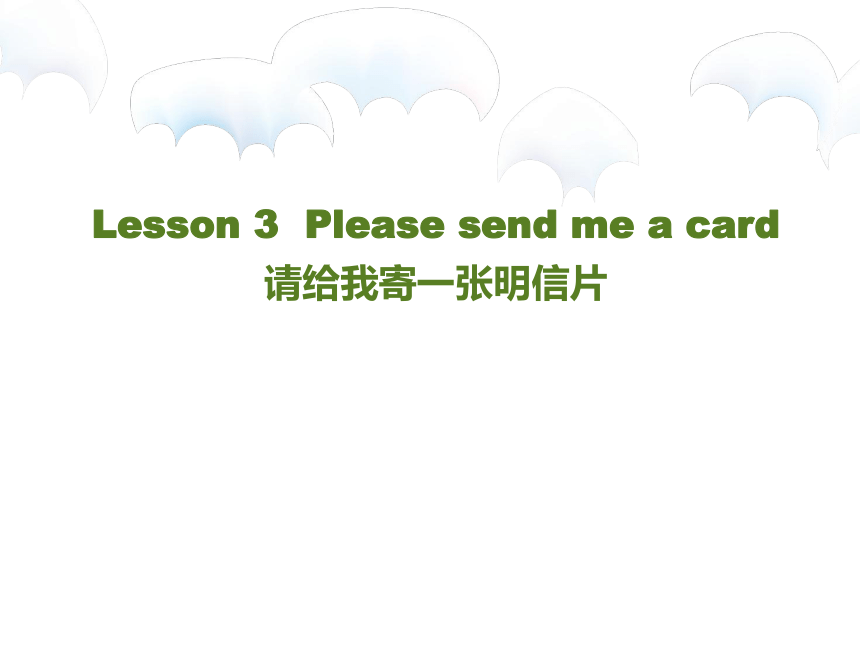 | |
| 格式 | pptx | ||
| 文件大小 | 643.4KB | ||
| 资源类型 | 教案 | ||
| 版本资源 | 新概念英语 | ||
| 科目 | 英语 | ||
| 更新时间 | 2025-01-02 16:36:33 | ||
图片预览

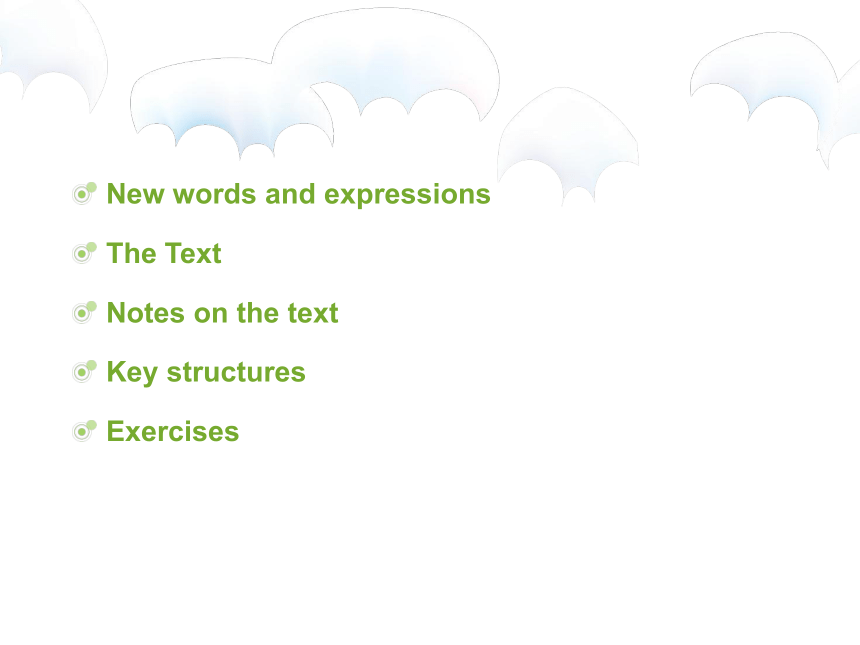
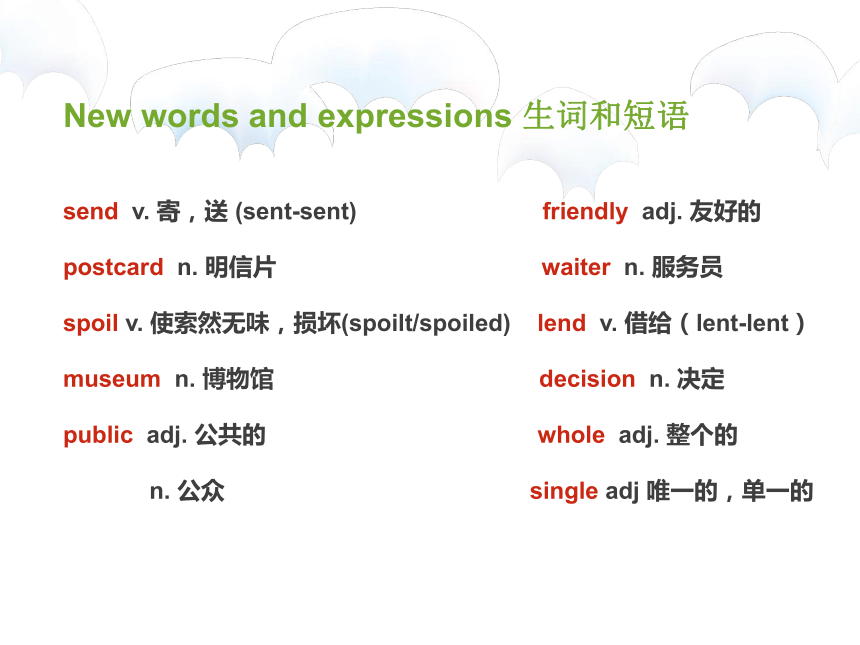
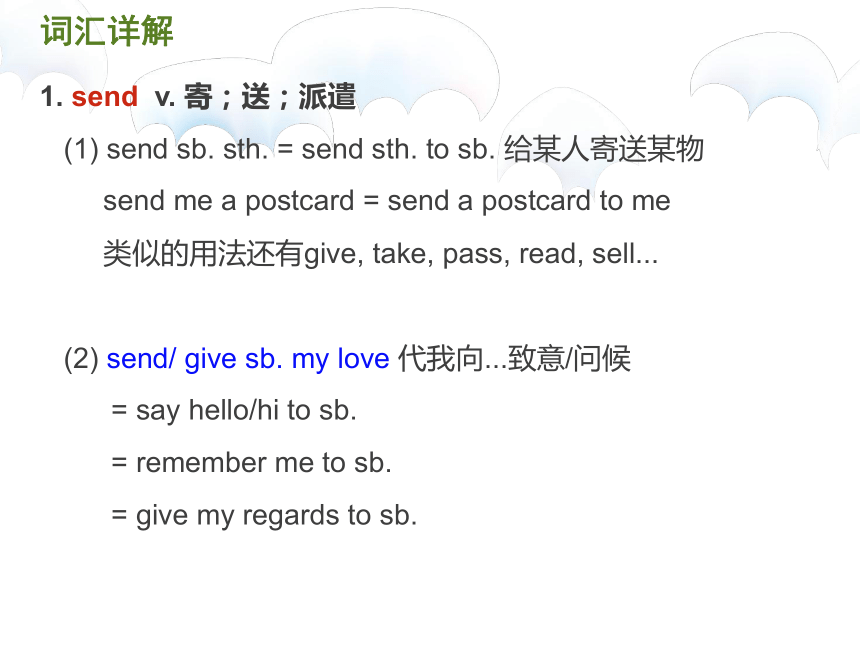
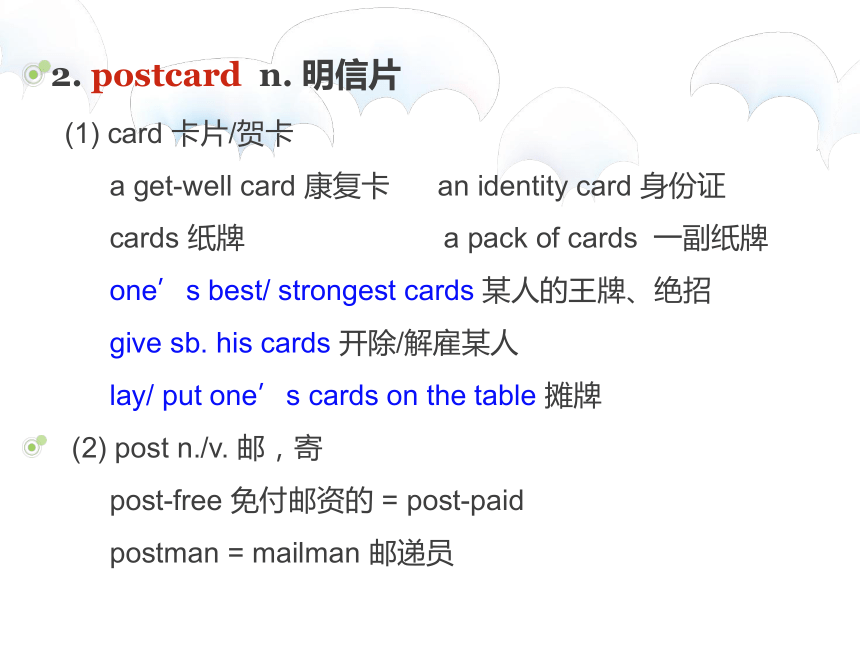
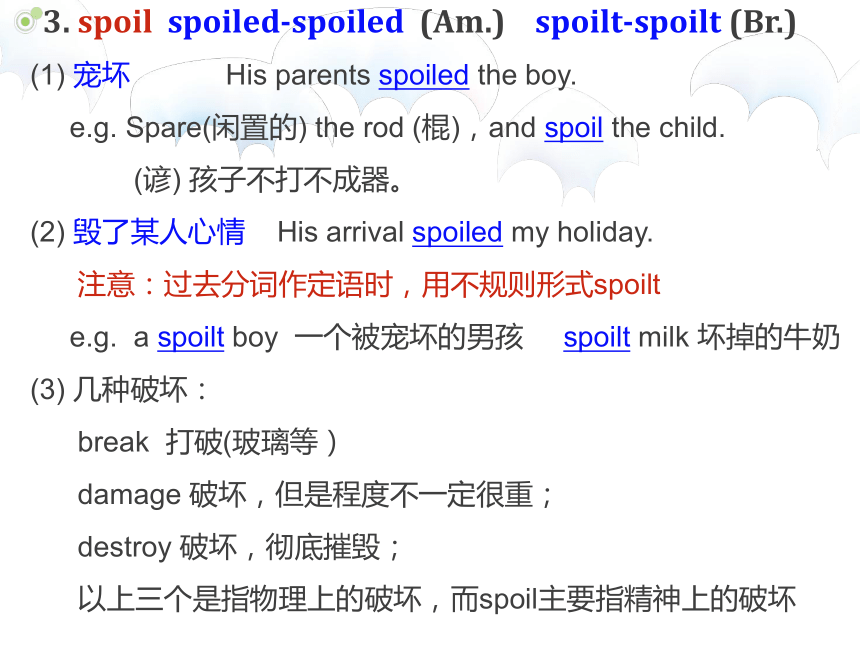
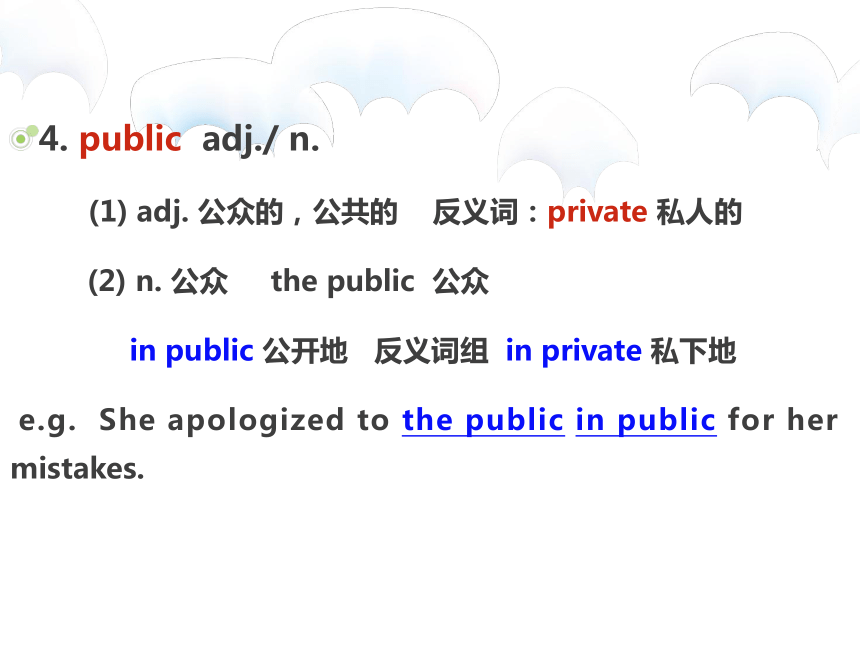
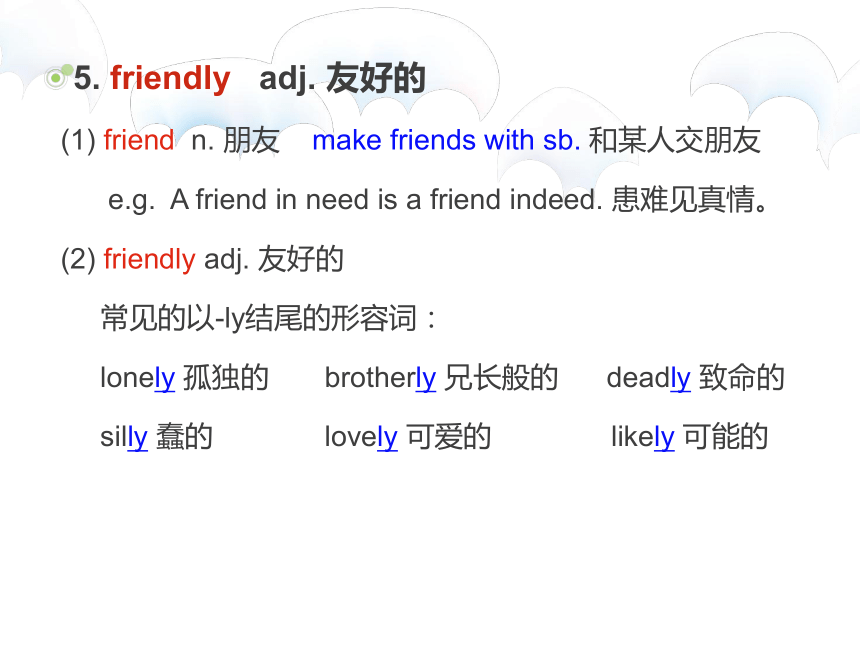

文档简介
(共26张PPT)
Lesson 3 Please send me a card
请给我寄一张明信片
New words and expressions
The Text
Notes on the text
Key structures
Exercises
send v. 寄,送 (sent-sent) friendly adj. 友好的
postcard n. 明信片 waiter n. 服务员
spoil v. 使索然无味,损坏(spoilt/spoiled) lend v. 借给(lent-lent)
museum n. 博物馆 decision n. 决定
public adj. 公共的 whole adj. 整个的
n. 公众 single adj 唯一的,单一的
New words and expressions 生词和短语
词汇详解
1. send v. 寄;送;派遣
(1) send sb. sth. = send sth. to sb. 给某人寄送某物
send me a postcard = send a postcard to me
类似的用法还有give, take, pass, read, sell...
(2) send/ give sb. my love 代我向...致意/问候
= say hello/hi to sb.
= remember me to sb.
= give my regards to sb.
2. postcard n. 明信片
(1) card 卡片/贺卡
a get-well card 康复卡 an identity card 身份证
cards 纸牌 a pack of cards 一副纸牌
one’s best/ strongest cards 某人的王牌、绝招
give sb. his cards 开除/解雇某人
lay/ put one’s cards on the table 摊牌
(2) post n./v. 邮,寄
post-free 免付邮资的 = post-paid
postman = mailman 邮递员
3. spoil spoiled-spoiled (Am.) spoilt-spoilt (Br.)
(1) 宠坏 His parents spoiled the boy.
e.g. Spare(闲置的) the rod (棍),and spoil the child.
(谚) 孩子不打不成器。
(2) 毁了某人心情 His arrival spoiled my holiday.
注意:过去分词作定语时,用不规则形式spoilt
e.g. a spoilt boy 一个被宠坏的男孩 spoilt milk 坏掉的牛奶
(3) 几种破坏:
break 打破(玻璃等)
damage 破坏,但是程度不一定很重;
destroy 破坏,彻底摧毁;
以上三个是指物理上的破坏,而spoil主要指精神上的破坏
4. public adj./ n.
(1) adj. 公众的,公共的 反义词:private 私人的
(2) n. 公众 the public 公众
in public 公开地 反义词组 in private 私下地
e.g. She apologized to the public in public for her mistakes.
5. friendly adj. 友好的
(1) friend n. 朋友 make friends with sb. 和某人交朋友
e.g. A friend in need is a friend indeed. 患难见真情。
(2) friendly adj. 友好的
常见的以-ly结尾的形容词:
lonely 孤独的 brotherly 兄长般的 deadly 致命的
silly 蠢的 lovely 可爱的 likely 可能的
6. lend v. 借出(lent-lent)
(1) lent sb. sth. = lend sth to sb. 把某物借给某人
borrow sth. from sb. 从某人那里借来某物
e.g. Can you lend me some money
Can you lend some money to me
(2) give/ lend sb. a hand = give sb. help 帮某人一把
lend sb. an ear (耐心地)倾听
be living on borrowed time 大难不死
7. decide v. 决定
(1) decide to do sth. 决定做某事
(2) decision n. 决定
make a decision to do sth. 做了做某事的决定
= make up one’s mind to do sth. 下定决心去做某事
8. whole
(1) adj. 完全的,整体的,全部的 (entire; complete)
e.g. Let’s forget about the whole thing.
(2) n. 整个,整体
e.g. Four quarters make a whole.
as a whole 作为一个整体
on the whole 总的来说,一般来讲
How many cards did the writer send
Postcards always spoil my holidays. Last summer, I went to Italy. I visited museums and sat in public gardens. A friendly waiter taught me a few words of Italian. Then he lent me a book. I read a few lines, but I did not understand a word. Every day I thought about postcards. My holidays passed quickly, but I did not send cards to my friends. On the last day, I made a big decision. I got up early and bought thirty-seven cards. I spent the whole day in my room, but I did not write a single card!
Frist listen and then answer the question.
明信片总搅得我假日不得安宁。去年夏天,我去了意大利。我参观了博物馆,还去了公园。一位好客的服务员教了我几句意大利语,之后还借给我一本书。我读了几行,但一个字也不懂我每天都想着明信片的事。假期过得真快,可我还没有给我的朋友们寄过一张明信片。到了最后一天,我做出了一个重大决定。我早早起了床,买来了37张明信片。我在房间里关了整整一天。然而竟连一张明信片也没写成。
Notes on the text 课文注释
1. teach v. 教
(1) teach sb. sth. = teach sth to sb. 教某人某物
teach oneself 自学
(2) teach sb. a lesson = give sb. a lesson 教训某人
teach fish to swim 班门弄斧
2. a few 一点儿 (肯定) + 可数名词
few 很少,几乎没有(否定) + 可数名词
little 一点儿(否定) +不可数名词
a little 很少,几乎没有的 (肯定) +不可数名词
3. word n. 词;话;消息
have a word with sb. 和某人说一句话
have words with sb. 和某人吵架
have a word in sb's ear 和某人说句悄悄话
have words from sb. 收到某人的消息
Actions speak louder than words. 行动胜于语言(谚)
4. think about 考虑,回想,想起
think of 考虑,计及
think over 再三考虑
think out 想出
First think, then speak. 先言而后行。(谚)
in 在(年,月,季节, 上午,下午,傍晚) in 2015, in February 2015, in winter
in the morning, in the afternoon, in the evening
on 在(具体某日,某 日上下午,星期几) on February 23rd, on Saturday, on Saturday morning
在2月23日上午 in the morning on February 23rd
on the morning of Februay 23rd
at 在(点钟,夜晚, 周末,节日期间) at twelve o'clock, at night, at the weekend,
on weekends, at Spring Festival
5. 介词in, on, at 的用法
6. make a decision = make up one's mind 做决定
decision n. 决定
decide v. 决定
decide to do sth.= make a decision to do sth. 决定去做某事
7. buy v. 买 (bought-bought)
buy sb. sth. = buy sth. for sb. 为某人买某物
8. spend v. 花费(spent-spent)
sb spend 时间/钱 on sth =sb spend 时间/钱 (in) doing sth I spent $2 on the pen. (in buying the pen)
She spent 2 hours on her homework.
=She spent 2 hours (in) doing her homework.
sb pay 钱 for sth I paid $2 for the pen.
It takes sb 时间to do sth It took her 2 hours to do her homework.
= To do her homework took her two hours.
sth cost 钱 The pen cost me $2.
summary writing 摘要写作
参考段落 postcards always spoil the writer’s holidays. He spent his holidays in Italy last summer. He thought about postcards every day. He did not send any cards to his friends. He bought thirty-seven cards on the last day. He stayed in his room all day. He did not write any cards. (45 words)
Answer these questions in not more than 50 words.
1. Do postcards always spoil the writer’s holidays or not
2. Where did he spend his holidays last summer
3. What did he think about every day
4. Did he send any cards to his friends or not
5. How many cards did he buy on the last day
6. Where did he stay all day?
7. Did he write any cards of not
key structures 关键句型
(1) 一般过去时:表示过去的状态,或主语过去具有的能力或过
去发生的动作。常与then, yesterday, last night, many years
ago等过去时间连用。
(2) 实义动词一般过去时的句式
①肯定句: 主语 + 动词过去式 + 其他。
I visited my grandparents yesterday.
②否定句: 主语 + didn’t + 动词原形 + 其他。
I didn’t visit my grandparents yesterday.
③一般疑问句: Did +主语 + 动词原形 + 其他?
Did you visit your grandparents yesterday
④肯定回答: Yes, 主语 did.
Yes, I did.
⑤否定回答: No, 主语 didn’t.
No, I didn’t.
(3) 实义动词过去式的构成:
①加ed: look—looked, listen—listened, play—played
②以不发音的e结尾的,加d:
like—liked, hope—hoped, live—lived, phone—phoned
③以辅音字母加y结尾的,把y变ied:
carry—carried, study—studied, worry—worried
④以一个元音字母和一个辅音字母结尾的重读闭音节,双写辅音字母,加ed:
drop—dropped, stop—stopped, shop—shopped, plan—planned
注意:snow—snowed, travel—traveled/traveled
⑤特殊变化:
do—did, have—had, eat—ate, buy—bought, go—went, ride—rode,
feed—fed, take—took, see—saw, get—got, come—came, win—won,
teach—taught, swim—swam, feel—felt, draw—drew, read—read
注意: ①动词的过去式,多用在一般过去时的肯定句中。
②问句中有did, 否定句中有didn’t,后接动词原形。
Exercises 练习
B Give the correct form of all the verbs in parentheses. Last summer, I _________(go) to Italy. I _______ (visit) museums and ________ (sit) in public gardens. A friendly waiter ________ (teach) me a few words of Italian. Then he __________ (lend) me a book. I ________ (read) a few lines, but I ________________(not understand) a word. Every day I __________ (think) about postcards. My holidays __________ (pass) quickly, but I __________(not send) cards to my friends. On the last day, I ________ (make) a big decision. I _______ (get) up early and ________ (buy) thirty-seven cards. I _________(spend) the whole day in my room, but I _____________ (not write) a single card!
went
visited
sat
taught
lent
read
didn't understand
thought
passed
didn't send
made
got
bought
spent
didn't write
C Give the correct form of the verbs in parentheses in the passage below.
My friend, Roy, ______ (die) last year. He _______(leave) me his CD player and his collection of CDs.Roy_______(spend) a lot of money on CDs. He ________ (buy) one or two new CDs every week. He never _____(go) to the cinema or to the theater. He _______ (stay) at home every evening and _______ (listen) to music. He often ______(lend) CDs to his friends. Sometimes they _________(keep) them. He ________(lose) many CDs in this way.
died
left
spent
bought
went
stayed
listened
lent
kept
lost
special difficuties V + 双宾语
英语中有的动词可以带两个宾语,且大多具有“给予”的含义。
Instead of saying: We can say:
He lent me a book. He lent a book to me.
He passed me the salt. He passed the salt to me.
She bought me a tie. She bought a tie for me.
She made me a cake. She made a cake for me.
Exercise
1. He paid the shopkeeper some money.
____________________________________
2. He handed me the prize.
____________________________________
3. The waiter brought a bottle of beer to the man.
_____________________________________
4. He sold all his books to me.
______________________________________
He paid some money to the shopkeeper.
He handed the prize to me.
The waiter brought the man a bottle of beer.
He sold me all his books.
Multiple choice questions 多项选择题
Comprehension 理解
1. The writer __________.
(a) doesn't like buying postcards
(b) doesn't like receiving postcards
(c) doesn't like writing postcards
(d) doesn't like postcards.
2. What was the writer's "big decision" _________
(a) He decided to write postcards to his friends.
(b) He decided to spend the whole day in his room.
(c) He decided to buy a lot of postcards.
(d) He decided not to write a single card.
C
a
Structure 句型
3. Last summer he went to Italy. He was _______ Italy last summer.
(a) at (b) to (c) in (d) on
4. ________ him a few words of Italian The waiter.
(a) Who taught (b) Who did teach
(c) What did he teach (d) Whom did he teach
5. He was a friendly waiter. He spoke to the writer ________.
(a) friend (b) as friends (c) like friends (d) in a friendly way
6. The writer _______ a few lines, but he didn’t understand a word.
(a) reads (b) read (c) red (d) reading
7. He spent the whole day in his room. He was in his room _______ day.
(a) the hole (b) the all (c) all (d) all of
C
a
d
b
a
Vocabulary 词汇
8. A waiter usually works in a ________.
(a) public garden (b) borrowed
(c) restaurant (d) private house
9. The waiter lent him a book. He _____ a book from the waiter.
(a) lent (b) borrowed (c) took (d) stole
10. On the last day he made a big decision. It was the ______
day of his holiday.
(a) final (b) end (c) latest (d) bottom
11. He made a big decision. He ___________.
(a) thought about it (b) made up his mind
(c) changed his mind (d) made a wish
12. He didn’t write a single card. So he ________.
(a) wrote only one (b) didn’t write even one
(c) wrote just one (d) wrote all the cards except one
C
b
a
b
b
The end.
Thanks for
your listening (*^__^*)
Lesson 3 Please send me a card
请给我寄一张明信片
New words and expressions
The Text
Notes on the text
Key structures
Exercises
send v. 寄,送 (sent-sent) friendly adj. 友好的
postcard n. 明信片 waiter n. 服务员
spoil v. 使索然无味,损坏(spoilt/spoiled) lend v. 借给(lent-lent)
museum n. 博物馆 decision n. 决定
public adj. 公共的 whole adj. 整个的
n. 公众 single adj 唯一的,单一的
New words and expressions 生词和短语
词汇详解
1. send v. 寄;送;派遣
(1) send sb. sth. = send sth. to sb. 给某人寄送某物
send me a postcard = send a postcard to me
类似的用法还有give, take, pass, read, sell...
(2) send/ give sb. my love 代我向...致意/问候
= say hello/hi to sb.
= remember me to sb.
= give my regards to sb.
2. postcard n. 明信片
(1) card 卡片/贺卡
a get-well card 康复卡 an identity card 身份证
cards 纸牌 a pack of cards 一副纸牌
one’s best/ strongest cards 某人的王牌、绝招
give sb. his cards 开除/解雇某人
lay/ put one’s cards on the table 摊牌
(2) post n./v. 邮,寄
post-free 免付邮资的 = post-paid
postman = mailman 邮递员
3. spoil spoiled-spoiled (Am.) spoilt-spoilt (Br.)
(1) 宠坏 His parents spoiled the boy.
e.g. Spare(闲置的) the rod (棍),and spoil the child.
(谚) 孩子不打不成器。
(2) 毁了某人心情 His arrival spoiled my holiday.
注意:过去分词作定语时,用不规则形式spoilt
e.g. a spoilt boy 一个被宠坏的男孩 spoilt milk 坏掉的牛奶
(3) 几种破坏:
break 打破(玻璃等)
damage 破坏,但是程度不一定很重;
destroy 破坏,彻底摧毁;
以上三个是指物理上的破坏,而spoil主要指精神上的破坏
4. public adj./ n.
(1) adj. 公众的,公共的 反义词:private 私人的
(2) n. 公众 the public 公众
in public 公开地 反义词组 in private 私下地
e.g. She apologized to the public in public for her mistakes.
5. friendly adj. 友好的
(1) friend n. 朋友 make friends with sb. 和某人交朋友
e.g. A friend in need is a friend indeed. 患难见真情。
(2) friendly adj. 友好的
常见的以-ly结尾的形容词:
lonely 孤独的 brotherly 兄长般的 deadly 致命的
silly 蠢的 lovely 可爱的 likely 可能的
6. lend v. 借出(lent-lent)
(1) lent sb. sth. = lend sth to sb. 把某物借给某人
borrow sth. from sb. 从某人那里借来某物
e.g. Can you lend me some money
Can you lend some money to me
(2) give/ lend sb. a hand = give sb. help 帮某人一把
lend sb. an ear (耐心地)倾听
be living on borrowed time 大难不死
7. decide v. 决定
(1) decide to do sth. 决定做某事
(2) decision n. 决定
make a decision to do sth. 做了做某事的决定
= make up one’s mind to do sth. 下定决心去做某事
8. whole
(1) adj. 完全的,整体的,全部的 (entire; complete)
e.g. Let’s forget about the whole thing.
(2) n. 整个,整体
e.g. Four quarters make a whole.
as a whole 作为一个整体
on the whole 总的来说,一般来讲
How many cards did the writer send
Postcards always spoil my holidays. Last summer, I went to Italy. I visited museums and sat in public gardens. A friendly waiter taught me a few words of Italian. Then he lent me a book. I read a few lines, but I did not understand a word. Every day I thought about postcards. My holidays passed quickly, but I did not send cards to my friends. On the last day, I made a big decision. I got up early and bought thirty-seven cards. I spent the whole day in my room, but I did not write a single card!
Frist listen and then answer the question.
明信片总搅得我假日不得安宁。去年夏天,我去了意大利。我参观了博物馆,还去了公园。一位好客的服务员教了我几句意大利语,之后还借给我一本书。我读了几行,但一个字也不懂我每天都想着明信片的事。假期过得真快,可我还没有给我的朋友们寄过一张明信片。到了最后一天,我做出了一个重大决定。我早早起了床,买来了37张明信片。我在房间里关了整整一天。然而竟连一张明信片也没写成。
Notes on the text 课文注释
1. teach v. 教
(1) teach sb. sth. = teach sth to sb. 教某人某物
teach oneself 自学
(2) teach sb. a lesson = give sb. a lesson 教训某人
teach fish to swim 班门弄斧
2. a few 一点儿 (肯定) + 可数名词
few 很少,几乎没有(否定) + 可数名词
little 一点儿(否定) +不可数名词
a little 很少,几乎没有的 (肯定) +不可数名词
3. word n. 词;话;消息
have a word with sb. 和某人说一句话
have words with sb. 和某人吵架
have a word in sb's ear 和某人说句悄悄话
have words from sb. 收到某人的消息
Actions speak louder than words. 行动胜于语言(谚)
4. think about 考虑,回想,想起
think of 考虑,计及
think over 再三考虑
think out 想出
First think, then speak. 先言而后行。(谚)
in 在(年,月,季节, 上午,下午,傍晚) in 2015, in February 2015, in winter
in the morning, in the afternoon, in the evening
on 在(具体某日,某 日上下午,星期几) on February 23rd, on Saturday, on Saturday morning
在2月23日上午 in the morning on February 23rd
on the morning of Februay 23rd
at 在(点钟,夜晚, 周末,节日期间) at twelve o'clock, at night, at the weekend,
on weekends, at Spring Festival
5. 介词in, on, at 的用法
6. make a decision = make up one's mind 做决定
decision n. 决定
decide v. 决定
decide to do sth.= make a decision to do sth. 决定去做某事
7. buy v. 买 (bought-bought)
buy sb. sth. = buy sth. for sb. 为某人买某物
8. spend v. 花费(spent-spent)
sb spend 时间/钱 on sth =sb spend 时间/钱 (in) doing sth I spent $2 on the pen. (in buying the pen)
She spent 2 hours on her homework.
=She spent 2 hours (in) doing her homework.
sb pay 钱 for sth I paid $2 for the pen.
It takes sb 时间to do sth It took her 2 hours to do her homework.
= To do her homework took her two hours.
sth cost 钱 The pen cost me $2.
summary writing 摘要写作
参考段落 postcards always spoil the writer’s holidays. He spent his holidays in Italy last summer. He thought about postcards every day. He did not send any cards to his friends. He bought thirty-seven cards on the last day. He stayed in his room all day. He did not write any cards. (45 words)
Answer these questions in not more than 50 words.
1. Do postcards always spoil the writer’s holidays or not
2. Where did he spend his holidays last summer
3. What did he think about every day
4. Did he send any cards to his friends or not
5. How many cards did he buy on the last day
6. Where did he stay all day?
7. Did he write any cards of not
key structures 关键句型
(1) 一般过去时:表示过去的状态,或主语过去具有的能力或过
去发生的动作。常与then, yesterday, last night, many years
ago等过去时间连用。
(2) 实义动词一般过去时的句式
①肯定句: 主语 + 动词过去式 + 其他。
I visited my grandparents yesterday.
②否定句: 主语 + didn’t + 动词原形 + 其他。
I didn’t visit my grandparents yesterday.
③一般疑问句: Did +主语 + 动词原形 + 其他?
Did you visit your grandparents yesterday
④肯定回答: Yes, 主语 did.
Yes, I did.
⑤否定回答: No, 主语 didn’t.
No, I didn’t.
(3) 实义动词过去式的构成:
①加ed: look—looked, listen—listened, play—played
②以不发音的e结尾的,加d:
like—liked, hope—hoped, live—lived, phone—phoned
③以辅音字母加y结尾的,把y变ied:
carry—carried, study—studied, worry—worried
④以一个元音字母和一个辅音字母结尾的重读闭音节,双写辅音字母,加ed:
drop—dropped, stop—stopped, shop—shopped, plan—planned
注意:snow—snowed, travel—traveled/traveled
⑤特殊变化:
do—did, have—had, eat—ate, buy—bought, go—went, ride—rode,
feed—fed, take—took, see—saw, get—got, come—came, win—won,
teach—taught, swim—swam, feel—felt, draw—drew, read—read
注意: ①动词的过去式,多用在一般过去时的肯定句中。
②问句中有did, 否定句中有didn’t,后接动词原形。
Exercises 练习
B Give the correct form of all the verbs in parentheses. Last summer, I _________(go) to Italy. I _______ (visit) museums and ________ (sit) in public gardens. A friendly waiter ________ (teach) me a few words of Italian. Then he __________ (lend) me a book. I ________ (read) a few lines, but I ________________(not understand) a word. Every day I __________ (think) about postcards. My holidays __________ (pass) quickly, but I __________(not send) cards to my friends. On the last day, I ________ (make) a big decision. I _______ (get) up early and ________ (buy) thirty-seven cards. I _________(spend) the whole day in my room, but I _____________ (not write) a single card!
went
visited
sat
taught
lent
read
didn't understand
thought
passed
didn't send
made
got
bought
spent
didn't write
C Give the correct form of the verbs in parentheses in the passage below.
My friend, Roy, ______ (die) last year. He _______(leave) me his CD player and his collection of CDs.Roy_______(spend) a lot of money on CDs. He ________ (buy) one or two new CDs every week. He never _____(go) to the cinema or to the theater. He _______ (stay) at home every evening and _______ (listen) to music. He often ______(lend) CDs to his friends. Sometimes they _________(keep) them. He ________(lose) many CDs in this way.
died
left
spent
bought
went
stayed
listened
lent
kept
lost
special difficuties V + 双宾语
英语中有的动词可以带两个宾语,且大多具有“给予”的含义。
Instead of saying: We can say:
He lent me a book. He lent a book to me.
He passed me the salt. He passed the salt to me.
She bought me a tie. She bought a tie for me.
She made me a cake. She made a cake for me.
Exercise
1. He paid the shopkeeper some money.
____________________________________
2. He handed me the prize.
____________________________________
3. The waiter brought a bottle of beer to the man.
_____________________________________
4. He sold all his books to me.
______________________________________
He paid some money to the shopkeeper.
He handed the prize to me.
The waiter brought the man a bottle of beer.
He sold me all his books.
Multiple choice questions 多项选择题
Comprehension 理解
1. The writer __________.
(a) doesn't like buying postcards
(b) doesn't like receiving postcards
(c) doesn't like writing postcards
(d) doesn't like postcards.
2. What was the writer's "big decision" _________
(a) He decided to write postcards to his friends.
(b) He decided to spend the whole day in his room.
(c) He decided to buy a lot of postcards.
(d) He decided not to write a single card.
C
a
Structure 句型
3. Last summer he went to Italy. He was _______ Italy last summer.
(a) at (b) to (c) in (d) on
4. ________ him a few words of Italian The waiter.
(a) Who taught (b) Who did teach
(c) What did he teach (d) Whom did he teach
5. He was a friendly waiter. He spoke to the writer ________.
(a) friend (b) as friends (c) like friends (d) in a friendly way
6. The writer _______ a few lines, but he didn’t understand a word.
(a) reads (b) read (c) red (d) reading
7. He spent the whole day in his room. He was in his room _______ day.
(a) the hole (b) the all (c) all (d) all of
C
a
d
b
a
Vocabulary 词汇
8. A waiter usually works in a ________.
(a) public garden (b) borrowed
(c) restaurant (d) private house
9. The waiter lent him a book. He _____ a book from the waiter.
(a) lent (b) borrowed (c) took (d) stole
10. On the last day he made a big decision. It was the ______
day of his holiday.
(a) final (b) end (c) latest (d) bottom
11. He made a big decision. He ___________.
(a) thought about it (b) made up his mind
(c) changed his mind (d) made a wish
12. He didn’t write a single card. So he ________.
(a) wrote only one (b) didn’t write even one
(c) wrote just one (d) wrote all the cards except one
C
b
a
b
b
The end.
Thanks for
your listening (*^__^*)
同课章节目录
